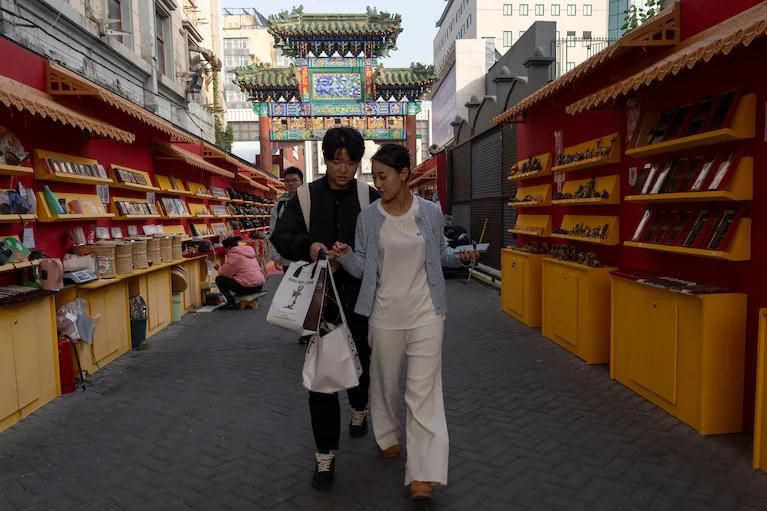By Eric Vandenbroeck and co-workers
The Problem for Beijing
China on Friday
November 8, announced a $1.4 trillion stimulus program to help local governments
deal with debt, as Beijing grapples with a struggling economy and
the possibility of a new trade war with the United States after
Donald Trump’s election victory this week.
The highly
anticipated announcement, the second stimulus package in six
weeks, is an effort to bolster cash-strapped local governments, including
those of cities and towns, but economists say the initiative will not be enough
to address underlying issues and inject real momentum.
At the end of the
week-long National People’s Congress on Friday, Chinese Finance Minister Lan Fo’an unveiled a program to raise local government debt
limits by $838 billion over three years, with an additional $559 billion
available for local governments to tap over five years.
This total is more
than double the $586 billion the Chinese government pumped into the
economy in the wake of the 2008 global financial crisis.
Lan said the new
stimulus plan was a “major decision” and would ensure the “smooth operation of
the economy and finance, and the actual debt reduction of local governments,”
according to an official transcript of the news conference.
Local government debt
has ballooned in recent years as China’s crumbling property market has caused a
cash crisis for local governments. With the value of real estate decreasing,
local governments haven’t been able to gin up funding through land sales.
The announcement
comes amid a gloomy year for the Chinese economy, which is struggling
to rebound from draconian “zero-covid” policies implemented by
Beijing during the pandemic.
Unemployment among
young people remains high, while official statistics show that real estate
investment fell in September, declining by more than 10 percent year over year.
A man walks in an upscale commercial area of Beijing
on Tuesday 5 November 2024.

Beijing has recently
stepped up its efforts to boost the economy in a bid to meet its target
of 5 percent growth for this year. Chinese financial authorities in
September announced
significant stimulus measures, including slashing interest rates and bolstering the
property market.
There have been some
small signs this has helped lift the economy: The stock market rallied, manufacturing
activity has increased and exports have
risen at their
fastest pace in a year, according to official statistics. Youth unemployment in
urban areas has meanwhile ticked down.
Positive changes were
emerging, Sheng Laiyun,
deputy director of China’s National Bureau of Statistics, said last month. But
the changes “are still preliminary” while the economic recovery “remains
unsteady,” he said.
Economists say that
Beijing’s announcement will do little to stem the urgent issue of deflation,
which many experts argue would be better addressed with direct cash payments to
families.
“What they have
announced is a package meant to manage risk, stabilize the economy to prevent
it from falling further, instead of directly stimulating domestic demand, which
is actually what I think they should do,” said Tianlei
Huang, an expert on the Chinese economy at the Peterson Institute for
International Economics. “Because I think the number one challenge the Chinese
economy faces now is deflation.”
Shoppers walk past outdoor stalls at the Wangfujing shopping street in Beijing on Nov. 1.

Huang said that
Beijing has a fundamental opposition to handing out
cash. “They don’t like welfarism,” he said, adding that Chinese officials think
it would “encourage people to become lazy.”
The measures
announced Friday will allow local governments to swap some off-the-books debt
for official debt.
This “hidden debt,”
which local governments use to fund infrastructure development and necessary
spending, amounted to more than $9 trillion last year, equivalent to more than
half of China’s gross domestic product, according to International Monetary Fund
estimates.
But China on Friday
put it at a much lower amount of around $2 trillion.
Lan said Beijing would
make it “a matter of ‘iron discipline’ not to create new hidden debt.” However many economists agree that these moves are unlikely
to be a long-term fix.
Local governments are
not given adequate funds from Beijing even as they face greater outlays, said
Victor Shih, the director of the 21st Century China Center at the University of
California at San Diego. The new package will temporarily reduce the burden on municipalities,
but they will still have to borrow to maintain basic government functions, he
added.
“It’s really not
going to address the problem in a meaningful way,” Shih said. “There will be
round after round of these small bailouts to make sure that things don’t get
out of control, but the underlying debt amount will still rise.”
Trump’s return to the
Oval Office adds another complicating factor to Chinese leader Xi
Jinping’s economic planning. On the campaign trail, Trump has threatened
to impose tariffs of up to 60 percent on Chinese goods.

In his first term, he
launched a punishing trade war on the world’s second-largest economy,
implementing tariffs on roughly $360 billion in Chinese goods.
Exports from China, which surged over the summer, have been a rare bright spot
for Beijing in the otherwise depressed economy.
“Beijing is launching
a stimulus largely to repair confidence,” said Gerard DiPippo, senior
geoeconomics analyst for Bloomberg Economics. “And if the U.S. is declaring a
second trade war, it might undo those stabilization measures on the confidence
side, certainly with foreign investors and possibly with Chinese households. So
that would be a rather big problem for Beijing.”
For updates click hompage here